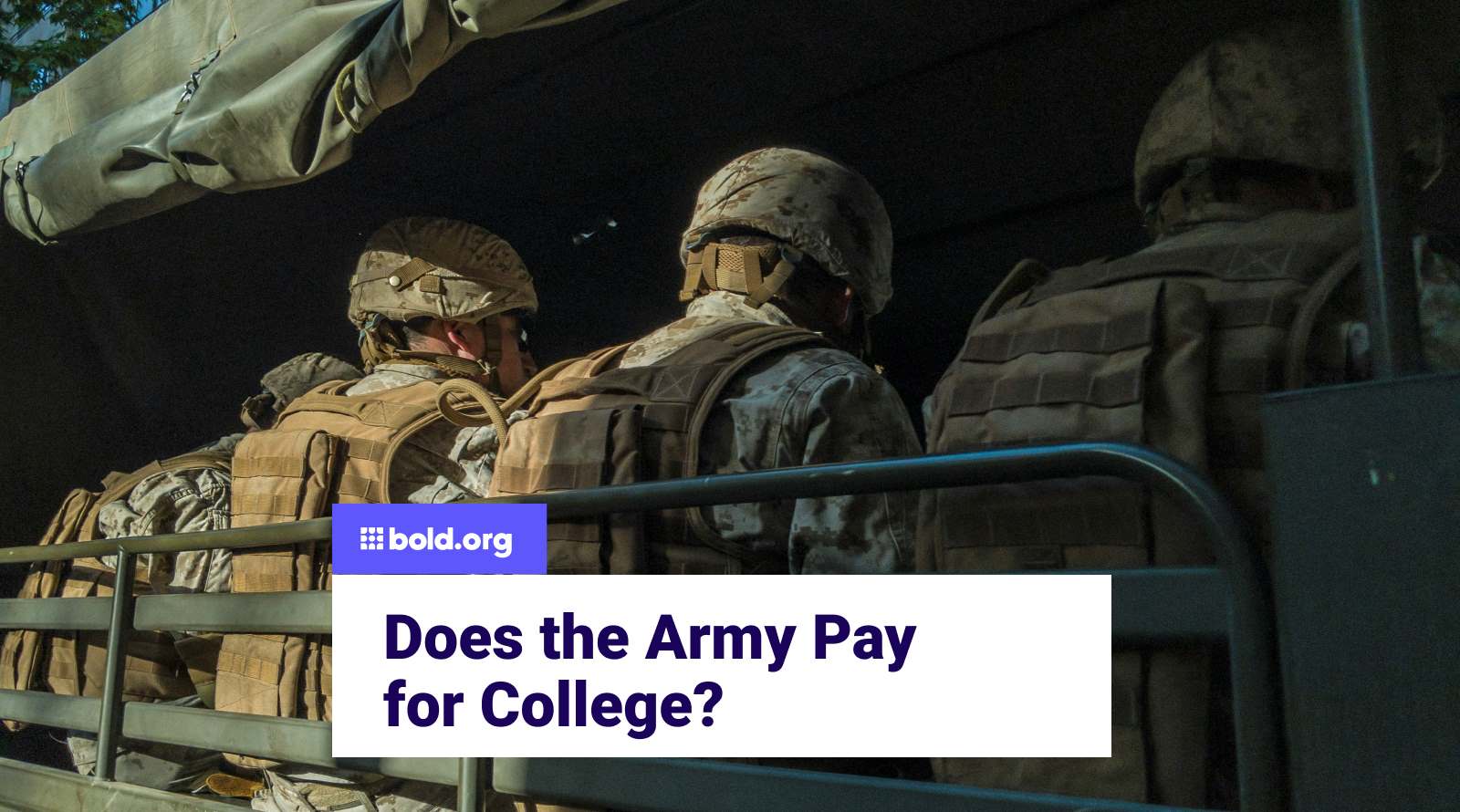Access thousands of exclusive scholarships
for free
If you're considering a career in the Army, one question you might want to uncover is what educational benefits the Army provides. The good news is that being on active duty, like a member of the Army National Guard, can help you pay for college. The Army offers various educational benefits to help service members pursue their educational goals.
This article will explore the positive aspects provided by the military and help you compare your background with the eligibility criteria and application process for each. Look no further as your journey towards graduating college debt-free begins today!
Don't miss out on Bold.org's opportunities to help you achieve financial and educational success. Create an account and apply for many scholarships today!
The Military's Education Benefits
Working under the government will provide educational benefits. The question isn't whether it will but rather how much. The two main programs I want to share information with you about are the Tuition Assistance (TA) program and the Post-9/11 GI Bill. Similarly, there is also the Montgomery GI Bill, which provides educational benefits for certain service members.
Get Matched to Thousands of Scholarships
Create your Bold.org profile to access thousands of exclusive scholarships, available only on Bold.org.
Create Free ProfileMilitary Tuition Assistance
The Tuition Assistance program was created to help active-duty service members pursue higher education while on active duty. Through this program, the Army will cover a significant portion of your tuition costs in return for your hard work.
The threshold for college tuition payment varies among students but is typically relatively high. It's a great way to get the best of both worlds, as you earn college credits or even complete a degree while simultaneously serving in the Army.
The best advantage of the Tuition Assistance program is that you aren't exclusively restricted to traditional college courses, as it extends to vocational and technical training programs.
This means that whether you're interested in pursuing a degree in engineering or learning a skilled trade, the military has you covered. The program also allows you to take courses online, making it even more convenient for those with busy schedules or stationed in remote locations.

Post-9/11 GI Bill
The Post-9/11 GI Bill is a comprehensive education benefit program that offers financial benefits for service members who have previously served on active duty since September 11, 2001.
Eligible service members get many advantages, including tuition and fee coverage, a monthly housing allowance, and a stipend for books and supplies. The Post-9/11 GI Bill is a valuable resource for those looking to pursue a college education after the completion of their military service.
A unique aspect of the Post-9/11 GI Bill, which is not offered in others, is the Transfer of Entitlement option. This allows service members to transfer their unused education benefits to their spouses or children.
That way, if going to school isn't necessarily your thing, family members close to you can. This can be a wonderful opportunity for military families to further their education and create a brighter future for themselves.
The Montgomery GI Bill
The Montgomery GI Bill, generally known as the MGIB, is another similar program that provides financial assistance to those who have served at least two years on active duty. It offers a monthly payment that can be used to cover tuition costs, as well as a variety of other education and training opportunities.
What sets the Montgomery GI Bill apart is that it offers different payment rates based on the length of service and the type of education or training pursued. In other words, the longer you serve, the higher your monthly payment will be.
This system rewards dedication and commitment to serving in the military, giving more to those who served longer. This program also provides benefits for apprenticeships and on-the-job training programs, giving service members the opportunity to gain valuable skills and experience in their chosen field.

ROTC program
ROTC stands for Reserve Officers' Training Corps. This organization, offered at many colleges and universities in the United States, trains students to become officers in the U.S. Armed Forces, specifically the Army, Air Force, Navy, and Marine Corps.
The ROTC program consists of a combination of academic coursework, physical training, and leadership development activities that students have to take in addition to class work.
Students enrolled in ROTC are usually awarded scholarships to help cover tuition and other expenses in exchange for a commitment to serve in the military after graduation. After completing their degree as well as ROTC training, students are commissioned as officers in their respective branches of the military and may serve on active duty or in the reserves.
Learn how to apply for an ROTC scholarship today!
Participation in ROTC is completely voluntary, and students may choose to pursue military service as a career or simply gain leadership and management skills while in college. It provides financial assistance to students in the form of scholarships to help cover the costs of tuition, fees, and other educational expenses. Even though these scholarships are mainly given on merit, there may also be need-based aid available.
Using scholarships as a compensation, students commit to participating in ROTC training and often go on to serve as commissioned officers in the U.S. Armed Forces after graduation. This financial support can make a significant difference in making college more affordable for students interested in pursuing military service careers.

Eligibility Requirements for Each Program
Once you have an understanding of each one, you might want to look into the eligibility requirements. These vary greatly depending on the specific program you are interested in, whether that be your academic achievements or military service.
Service Requirements for Tuition Assistance
In order to be eligible for Tuition Assistance, you must currently be an active duty service member and have completed at least one year of service after completing initial training. You must also have a high school diploma or equivalent and or other certain academic requirements set by the Army.
Luckily, the Tuition Assistance program is not limited to traditional college degree programs like obtaining an undergraduate degree. It may also be used for vocational and technical training, as well as distance learning programs. This provides service members with a wide range of educational opportunities to enhance their skills and knowledge.
Eligibility for Post-9/11 GI Bill
To be eligible for the Post-9/11 GI Bill, you must have served at least 90 days on active duty following September 10, 2001. The duration of your service will dictate the percentage of benefits you are eligible to receive.
As a general rule, the greater you employ, the more you will receive. For example, if you have served at least three years on active duty, you will be eligible for 100% of the benefits provided by the program.
The great attribute of the Post-9/11 GI Bill is that it also offers additional benefits such as a monthly housing allowance and a stipend for books and supplies. These extra benefits can greatly assist service members in covering the costs associated with pursuing higher education.
Qualifying for the Montgomery GI Bill
The eligibility requirements for the Montgomery GI Bill will largely be contingent on your specific circumstances, including but not limited to how long you have been in the military and the length of your service. In general, you are required to complete at least two years of active duty service, contribute $100 a month for the first 12 months of service, and receive an honorable discharge.

ROTC Eligibility Requirements
ROTC (Reserve Officers' Training Corps) programs in the United States can be slightly different from each other. Thus, the expectations may vary slightly depending on the branch of service (Army, Navy, Air Force, or Marines) and the specific program within that branch.
It's critical to look into the specific ROTC program you're interested in for the most accurate and up-to-date eligibility requirements, as they change between branches and institutions. Additionally, some ROTC programs offer scholarships that may have additional eligibility criteria and obligations.
How to Apply for Military Education Benefits
While the application process will vary depending on the program you are interested in, here are a few tips to help you get a good kickstart.
Steps to Apply for Tuition Assistance
If you are interested in applying for Tuition Assistance, you should collaborate with an education counselor or advisor to develop an education plan. This plan will outline your academic goals and the courses you intend to take. It's crucial to choose a program that aligns with your career objectives and meets the requirements for Tuition Assistance.
Once your plans are approved, you can submit your application for it through the Army's online portal. The online application will prompt greater questions about your chosen program, including the course names, start and end dates, and the cost per credit hour. Ensure to double-check the information you indicate to avoid any delays in processing your application.

Applying for Post-9/11
For the Post-9/11 GI Bill benefits, you will need to become comfortable with the Department of Veterans Affairs (VA) website. The online application form will require you to provide detailed information about your military service record, including your dates of service and character of discharge.
In addition to your military service record, you will also be asked to include your educational history, such as transcripts from any previous education or training programs you've completed. This information helps the VA determine which specific benefits are tailored for your application. In order to ensure a timely response, you must submit your application well in advance.
Process for Montgomery GI Bill Application
Applying for the Montgomery GI Bill involves submitting the Application for VA Education Benefits (Form 22-1990). This form prompts you to share more information regarding your military service, branch of service, dates of active duty, and any periods of reserve service.
In addition to the application, you may also be required to submit supporting documentation, such as your DD-214 form and transcripts from any previous education or training programs. These documents not only help the VA verify your eligibility but also determine the benefits you will ultimately qualify for.
Upon approval, you will receive a Certificate of Eligibility from the VA. This certificate serves as proof of your eligibility for Montgomery GI Bill benefits and must be presented to your chosen educational institution.
While the application process can be intricate, the reward is rather worth it. With careful attention to detail and timely submission of all required documents, you'll be on your way to accessing the educational opportunities you deserve.

Limitations and Restrictions of Military Education Benefits
Although these are some pretty generous education benefits, it doesn't necessarily mean that there aren't limitations and restrictions put in place. Prior to signing up for something you may not be fully acclimated with, you should understand how to tailor your educational goals effectively and make the most of the benefits available to you.
Understanding the Cap on Tuition Assistance
Tuition Assistance is subject to certain limits imposed by the Army. The current maximum amount of tuition assistance that can be provided per credit hour is $250, which comes out to be $4,500 per fiscal year.
This cap makes sure that the program remains sustainable and accessible to a larger number of service members. Sometimes, there are also limitations on the number of credit hours or courses that can be taken each semester to ensure a balanced workload and academic progress, meaning even less aid.
Limitations of the Post-9/11 GI Bill
The Post-9/11 GI Bill benefits only persist for up to 36 months of education or training. These benefits may expire after 15 years from the date of your last discharge or release from active duty.
This is designed to encourage timely utilization of the benefits and to ensure that service members have the opportunity to pursue their education goals within a reasonable period. Therefore, it's crucial to plan your education goals accordingly and make sure you utilize the benefits within the specified timeframe.

Restrictions of the Montgomery GI Bill
The Montgomery GI Bill has implemented specific restrictions that deviate from traditional applications as it takes into consideration when you enter the military and the length of your service. For example, if you entered active duty after July 1, 1985, you must have had your military pay reduced by $1,200 to qualify for the program.
These restrictions are in place to ensure that the benefits are targeted towards those who have made a significant commitment to military service. It's essential to review the specific requirements and limitations that apply to your situation to determine your eligibility and make informed decisions about your education.
Expanding your knowledge and skills through education is a valuable opportunity provided by the military. Regardless of which program you choose, please remember that there are options available to support your educational goals. By keeping up to date with the criteria and application process for each program, you can make informed decisions about your education and take advantage of the benefits that best suit your needs.
Bold.org Scholarships
Last but not least, Bold.org has an array of scholarships available to military families/students that eligible applicants can take advantage of. If, at any point, you find that the programs above aren't entirely covering your college costs, you can apply for the many scholarships that are updated on the platform daily. The platform is built for your success, giving you complete autonomy over your journey. Here are a few scholarship pages to provide you with a head start:
- Top Military Scholarships
- Military Dependent Scholarships
- Military Children
- Veteran Scholarships
- Military Spouse Scholarships

Frequently Asked Questions About College and the Army
How do I balance military duties with college coursework?
Balancing military duties and college can be challenging but achievable with proper time management and organization. Utilize resources such as academic advisors, military education counselors, and supportive supervisors to help manage your schedule effectively.
How can I find colleges or universities that accommodate military members?
Many colleges and universities have specific programs and resources tailored to military members and veterans. Research schools that are military-friendly and offer support services such as flexible class schedules, credit for military experience, and veterans' centers on campus.
Can I attend college full-time while serving on active duty?
Yes, it's possible to attend college full-time while serving on active duty, although it may require careful planning and coordination with your unit. Some service members opt for online or evening classes to accommodate their military responsibilities.
Visit our Scholarship Blog and get all the insights on military scholarships!


